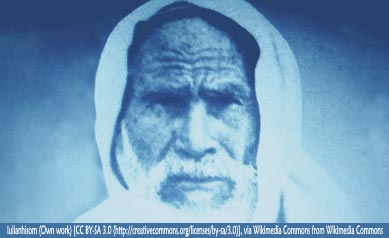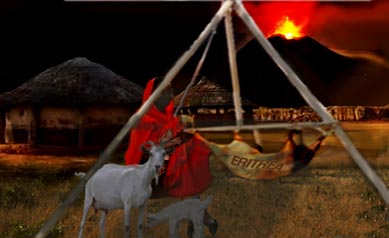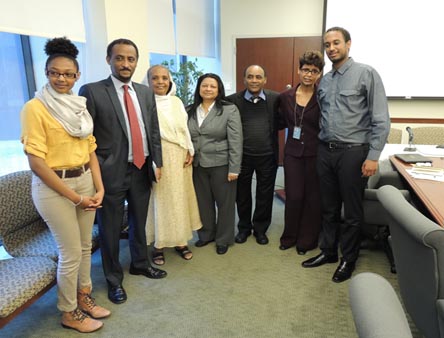I Was Wrong

Ever ordered “Chef’s Special” at a restaurant? Don’t: it is stuff the restaurant couldn’t sell. Also, two Americans opened a Chinese restaurant in China and everything Chinese was alien to the Chinese: kung-pao chicken, Mongolian beef, and definitely Chow Mein, invented by a San Franciscan chef and of course the take-out Chinese boxes (which the Chinese saw in movies and thought it belonged to one Chinese restaurant) and, of course, fortune cookies, originally Japanese—borrowed from Japanese internment camps in America. So, yeah, today’s Al-Nahda is a Chef’s Special: it is going to be that kind of article: this is your chance to run away. Short version: I was wrong about the Arab Spring; if you are a dependent you will always complain about the size of the welfare check; I am pessimistic about the Eritrean Lowland League; and, the Exiled Opposition need to know our limitations.
I Was Wrong
I despised what Zine El Abidine Ben Ali (Tunisia), Moammer Gaddaffi (Libya), Ali Abdullah Saleh (Yemen), Bashar Assad (Syria) had done to their countries and I thought taking a gamble on a revolution is the right thing to do because whatever replaces them can’t possibly be worse. Clearly, I was wrong. It was a case of my idealism sneaking up on me.
Before I specify how and why I was wrong, I need to give credit to one Eritrean political leader who told me, at the time, that my assessment is wrong. What? No, it is not kbur President Isaias Afwerki. All he said at the time was that it was “creative chaos” (Fawda Kahalaqa, borrowing an Arabic phrase he heard from BBC Arabic) engineered by CIA/Langley and as to how it will turn out “we shall all wait and see,” which is Mystification 101 for “I have no idea.” No. The guy who called it right was an opposition leader who emailed me to say that while he has high hopes for Tunisia, because it is different, (by which he meant it is a literate society, with a fairly sized middle class and a long history of organized labor) he is not so optimistic about the rest. I will share his name (in the Forum) once he gives me the permission to do so.
To see how I was wrong, let’s take one example, Libya, not least because its leader, Muammer Kaddafi, used to infuriate me mostly because the three-letter media (ABC, BBC, CNN, CBC, NBC, FOX) told me to hate him. First, let’s take a look at its former colonizer, Italy; then let’s take a look at the state that pretty much runs the NATO alliance that tipped the war in favor of those who defeated it, the United States. The process of how Italy became a nation-state was long (40+ years) and arduous and organic. The process of how the United States of America became what it is now is even longer. Imagine if in the middle of their civil wars, the European Union or the United Nations had jumped in to “mediate” and threaten sanctions and issue resolutions promising to remain seized with the matter?
The problem with Libya, as is the case with nearly all African states, is there was no organic nation-state formation: they were declared by decrees. And, when they tried to deal with critical issues of governance, all sorts of assorted do-gooders will come in to fix things. Just yesterday, Ethiopia, which is clumsily trying to mediate the conflict between South Sudan warlords Silva Kiir and Riek Machar, decided to go over their heads and address the people of South Sudan. Reuters reported that it had seen a confidential report that the African Union may just fire the two leaders and run the country. Really.
In Libya, there are now two “governments”—one in Tripoli and one in Tobruk. The one in Tripoli is run by the Muslim Brotherhood of “Libya Dawn”, the one in Tobruk is the West’s favorite kind—its General has been called Libya’s answer to General Al-Sisi. They are essentially city states. In between are new emerging city-states—Derna, Sirte–some pledging allegiance to ISIS. The United States wants “moderates” from Tripoli and Tobruk to form a unity government. Egypt wants (but can’t get) UN permission to intervene directly in support of Tobruk and to destroy the Muslim Brotherhood in Tripoli (for its own domestic reasons.) And what Egypt wants, France supports because it just sold it billions worth of Rafael fighter aircraft which just has to be test-driven. But Turkey…
The guy who was in charge of the NATO bombing (the US ambassador to NATO, Ivo Daalder), was asked if, in retrospect, the intervention in Libya was wrong. “Unfortunately,” he replied, “the way Libya has evolved demonstrates that just because you give people the opportunity to decide their own future they don’t always decide in the right or best way — in the way that we would have wanted. So the situation in Libya has gone from bad to worse and is horrific in many dimensions. The future doesn’t look much brighter.”
So, I was wrong. There are no Omar Mukhtars in Libya now; no lions in the desert: just jackals and hyenas. It is possible to get something much worse than a brutal dictator: you can get multiples of brutal dictators all reporting to foreign interests.
And Therefore?
Reporters for Ethiopian opposition TV station, ESAT, went to Eritrea to interview President Isaias Afwerki where they found His Excellency supervising our renaissance dam (small r, small d.) You can watch the English interview, if you are sadistic, (the Tigrinya-Amharic version is unwatchable.) But if you want the summary, it is the usual: Me Only, Me Too, Me Neither. Only I am capable of extraordinary things (“we never made a mistake.”) Whatever great things the world thinks it is doing, I am doing them too. Whatever quote unquote good things I am not doing, they are either not important (elections) or the world is not doing them, either (free press, Guantanamo.) Me Only, Me Too, Me Neither.
Actually, since this is a Chef Special (you were warned!) let me digress a bit. A lot.
After ESAT (we will get back to them), the Organization of African Trade Union Unity (OATUU) descended on Eritrea last week, and this is what we learned from their interactive session with the president:
- Me Only: Eritrea is the only country whose head of state goes anywhere unescorted by intimidating bodyguards and lots of pomp and circumstances said one of the OATUU delegates. Riiiiiight.
- Me Neither: “I’ve had a very controversial discussion with my colleagues [whom I haven’t arrested so far]”, said Isaias Afwerki, “…The Labor and Trade Union movement in the continent have been made irrelevant or non-existent….Do we have trade union movements in our societies? Do we have labor movements in our society? I don’t see that as a reality…[So, beliekin, setikhin, Aadikhin kidaley].”
- Me Too: “I share the strategic view of the Americans in the region. French forces in Djibouti have been a stabilizing factor, and U.S. troops will add to that. You need outside powers to keep order here. It sounds colonialist, but I am only being realistic.” Isaias Afwerki, interview with The Atlantic magazine on April 1, 2003. I just added that to remind those who want to bestow on him the Kwame Nkrumah, Patrice Lumumba, Amical Cabral Award for Pan-Africanism that he ain’t all that.
My favorite “Me Too” story of Isaias Afwerki comes in the form of an interview he had with Hwyet magazine in 1995. Back then, the buzz in industrial psychology was Total Quality Management (TQM): the US was feeling like it was going to be overtaken by Japan which was using TQM, developed by a US efficiency expert W. Edwards Demming, who was ignored by his countrymen and found a receptive ear in Japan.
By coincidence, I was working with an American car company to help its union learn total quality management. TQM is many things, and at its core is employee cross-training. In the interview, Isaias Afwerki says that this “fashion” called TQM “is something we had developed in Nakfa decades ago when we were assigning our people from military to civilian….” Again, TQM is many things—accountability being at its core, customer services being its end-game—but those don’t interest him.
Back to ESAT. They asked many very good questions (few of which were directly answered) but what really struck me because it is so familiar is one which, paraphrased, goes something like this:
“Many Ethiopian opposition leaders in Eritrea complain that Eritrea is not interested in nurturing groups who have nationalist interests; it favors groups organized along ethnicities. Some have even complained that it uses them as toys to pressure Ethiopia, to deny it peace of mind, but the Eritrean government really doesn’t want to see the downfall of the Weyane government…”
It is striking because many say the same of the Ethiopian government. So there are four possibilities: both Eritrean and Ethiopian opposition are right; both Eritrean and Ethiopian opposition are wrong; only Eritrean opposition is right; only Ethiopian opposition is right.
What was Isaias Afwerki’s answer? Whatever it is, it will appear in the next Somalia Eritrea Monitoring Group report so you know he was circumspect. But the point is this: an opposition group, based in the Diaspora, cannot make any impact unless it has direct connection with the home country. And using the Anti-Terrorism Proclamation (ATP), the Ethiopian government has arrested bloggers so what chance, realistically, do the Ethiopian opposition have to affect an outcome? They should take a page from Kinjit and go for the non-sensational, slow, gruesome evolution in their country because there is a formidable force—domestic and foreign—aligned against their revolution. This, despite the fact that they have to accept a constitution that was never negotiated, never discussed, but rushed through to consolidate TPLF’s choke-hold.
And therefore? How does this relate to Eritrean Politics? I will get back to that…if you don’t eat your meat, how can you have a pudding as the British philosopher-king Roger Waters once wrote.
Awareness and Action
I like my sociopolitical essays to come to me in boring, dispassionate treatise with footnotes longer than the content. That certainly is not the type of document presented by the Eritrean Lowland League (ELL.) Maybe that’s my fault: I didn’t read the original version, in Arabic, and maybe some things were lost in translation. But based on my reading so far, I think they are going to have a problem at the awareness stage and the action stage. But first, crash course of post-Italian Eritrean history (corrections are welcome.)
May 1941, shortly after British Military Administration took over Eritrea from defeated Italy, Eritreans formed “MaHber Fiqri Hager” (League of Love of Nation.) Later on, it dawns on the participants that they have completely different idea of what the nation is and how to express their love, and they splintered into Al Rabita al Islamiya (Muslim League, calling for independent Eritrean state) and Hebret/Andnet (calling for union with Ethiopia.) The split was largely (almost completely) on the basis of religion. A few years later, the Muslim League creates an independence bloc by forming alliance with progressive Christians (Independence Bloc). The Muslim League splits largely (ok, completely) on the basis of geography: Muslim League (Western lowland plus highland Eritrea) and Eastern Muslim League (Eastern Escarpment/Red Sea.) As the march towards either union or federated state becomes all but inevitable, a member of the Eastern lowland advocates for lowland federation with Sudan.
1951: Eritrea is federated. 1958, Mohammed Said Naud, a Western Lowlander, founds “Hareket TaHrir Eritrea” (Eritrean Liberation Movement) in Port Sudan. In the Eritrean highlands, its first organizers were Mohammed Berhan Hassen and Nuru Abdulhai (highlanders) where its official name was “Minkiskas Harnet Ertra” but was better known by the name the Ethiopian CID came up for it based on its cell-size: “Mahber Showate.” (Group of 7.) This was the first truly diverse Pan-Eritrean organization, calling on civil disobedience to overthrow the Ethiopian government.
1962: Ethiopia annexes Eritrea. 1961: the Eritrean Liberation Front is established calling on armed struggle as the means for achieving Eritrean independence. Almost all of the founders were Western Lowlanders and one of their first acts was to liquidate the Eritrean Liberation Movement which, sensing that its civil disobedience had been rendered moot following the annexation, had resorted to armed struggle. The next big fissure was the leadership of the ELF (then still mostly Western lowlanders) declaring a war of extermination against the mostly Eastern Lowland PLF (Romadan Mohammed Nur, Osman Saleh Sabbe.) By the time the ELF decided to have its first National Congress (1971), it had, at least programmatically, wholly embraced Marxism-Leninism and the “accepted” way of stratifying people vertically was by class (working class, peasant, bourgeoisie) and horizontally by language and gender.
In fact, on the surface, all the PLF (later EPLF) did is to embrace language as the only Halal way of stratifying people horizontally—the only two things it did is drop “speaker” as a suffix (instead of “Tigrinya-speaker” for example it opted for “Tigrinya”) and it dropped a group (“Elit”) and it added a group who were mysteriously missing from ELF’s approved groups: “Rashaida.”
I said on the surface. At the organizing level, what the ELF gave PLF-2 (later EPLF) was a gift that keeps on giving: if its ok to organize people on the language level, said the young author of Nehnan Elamanan (We & Our Principles), here’s what I will do:
a. I will tell them that the geographic organizations they inherited (Hamasen, Seraye, Akeleguzai) are just inventions of colonizers to divide us. Henceforth, we are “Tigrinya.”
b. Do not be guilted by anyone who tries to tell you that you are less of a nationalist than they are: you were part of ELM (pride), and “they” were part of the movement to separate Eritrea into Sudan just like our forefathers were part of the movement to hand over Eritrea to Ethiopia;
c. They are claiming they are Arabs; and you and I know we are not Arabs. Are you really going to take that?
d. You, demographically, outnumber them: please refer to the attached exhibit.
e. They have raided your cattle, abused your women, and slaughtered (not killed, but slaughtered with a knife, feel free to use any scary image you have in your head of the Mussulman) your brother while indulging themselves with multiple wives (wink wink.) Are you really going to just take that?
The reaction to this message by Isaias Afwerki was—complete revulsion by highlanders. Herui Tedla Bairu, then the de-facto leader of the ELF, proved it to me thusly: most highlanders continued to flock to the ELF after the publication of the Nehnan Elamanan Manifesto. Sure. But, here’s what Isaias Afwerki intuitively understood… something that we now know courtesy of communications experts. Part of the reason I call Isaias Afwerki (and it infuriates my fellow opposition when I say that) a great communicator: he can communicate what Simon Sinek calls all levels of the golden circle: the what, the how, and most, most, most, most importantly the why. This, says Simon Sinek corresponds perfectly to our brains: the neocortex deals with the what (it is the rational and analytical), the limbic brain deals with the how and why (feelings, trust, loyalty. It is “responsible for all human behavior, all decision-making, and IT HAS NO CAPACITY FOR LANGUAGE.”)
All actions are preceded by awareness (conscious or subconscious.) My question is: how is the ELL going to create awareness? I am trying to visualize an organizer addressing a crowd: what language will he or she use? Arabic? Tigre? That in itself is a political statement–either choice will antagonize a segment of the Lowlander. Now, let’s assume it’s Tigre: is the person going to say, “H’na seb meta’Het…” to the Tigre/Blin/Bedawiyet/Afar speakers? Does that have an emotional appeal that can connect at the reptilian/limbic brain level of the audience more than, say, an appeal to religion? Does anyone say “H’na seb meta’Hit”? And if so, in contrast to whom? “htom, seb kebesa”? Will s/he say, “Hna Tigre…”? In contrast to htom, Tigrinya? Wait. According to Kjetil Tronvoll (“Mai Aini, A Highland Village in Eritrea”), Tigrinya means “language of the Tigre people. Tigr(e) is the speaker, while “inya” is the suffix.” Moreover, the late Omar Jaber says that the Tigrinya and Tigre are so inter-mingled and inter-married that it is pointless to organize politics along those lines.
If one chooses a Marxist approach to organization–by class and lifestyle–isn’t the agrarian vs pastoral a legitimate argument, transcending geography? Shabait.com is full of articles of how Eritreans who gave up pastoral lifestyle for sedentary lifestyle have received better social services. Isn’t the pastoral-agrarian divide (a fine horizontal, class-based, Marx-sanctioned divide) something worth debating? Something that also happens to be verifiably true: that the PFDJ has no clue how to develop an economy based on pastoralism and it is predominantly biased towards agrarian society? The Africa Development Bank says (indirectly) that Eritrea’s literacy rate is driven down by the very low rates in Southern Red Sea whereas shabait.com tells us that in Debub Eritrea, literacy is now at 70%. Isn’t that data-driven information something that the ELL should base its arguments on?
And once you have the “awareness” (assuming you can get the Eastern Escarpment and Western Lowland people to think of themselves as One People) what is the “action”?
I ask all these questions because I think “diversity” is terrible when it comes to nation-building. Particularly given the EPLF’s infatuation with “mother-tongue language” which is impractical (For example: a Saho-speaker attends a Saho school and when his parents get transferred to Hagaz… the kid attends a Blin school? Riiiiiight.) The less the diversity, the easier it is to build a state. Singapore, Eritrea’s idol-state, just celebrated its 50th birthday; and it dealt with its “diversity”–which was basically three groups–very paternalistically and, in my view, correctly. So, if the ELL has a formula which lets us escape from the very unjust let’s-pretend-we-are-9-ethnic-groups-on-expo-days-but-at-the-state-level-actually-concede-there-is-only-Tigrinya, I am all for it. But so far, what they have is not a persuasive presentation: heavy on sentimentalism, light on data. It doesn’t even have something as basic as demographics.
The most exciting thing about ELL is that it brought back one of the most gifted, most exciting Eritrean writers, Ali Salim, by giving him something to write about (until he gets bored.). Now if only something could inspire the other insanely-gifted writer, Burhan Ali, to come back.
And what does that have to do with the subject I have been procrastinating on: the fight to bring about change in Eritea?
And Therefore, Part II
The job, the ONLY job, of the Exiled Eritrean Opposition is to present a forward-looking non-scary alternative to the Home Based Eritrean Opposition. By that test, Addis-based opposition fails and so does the Eritrean Lowland League. Wait, you should stop slapping your knees and laughing uproariously now and asking “WHAT home based Eritrean opposition”? Ok, are you finished? Let’s deal with this, my fellow exiled Eritrean.
Since 1991 and up until this week, there has been Home-Based Eritrean opposition. Some we hear about, some we don’t. Just this week, Eritrean youth (high school students) in Adi Keyh, spontaneously stood up to the Eritrean government, overrun police stations, which was sent to demolish old homes. Shots were fired. One died, two were injured. Maj General Philipos is headed there to give them all sorts of assurances that all is good. Then some flunkie from Wedi-Kassa’s office will go to pick up all “the leaders”, although there were none and it was completely spontaneous. But there are ALWAYS leaders: this kid was the captain of the neighborhood sock-football game: off with him!
In contrast, what have we done? Really now, I didn’t say, “what have YOU done?” I asked what have WE, the exiled opposition done? We did great at the AWARENESS stage (which is no small feat, so let’s take a bow.) But at the ACTION stage? We re-arranged the decks. We created logos. We marched. We, umm, yeah, we created Facebook groups! We consolidated! We re-consolidated! We broke up! We re-re-re consolidated!
We mistook intent for results. A friend goes to Addis Abeba and meets with the Bayto people. “And?”, I ask. And, I saw their lifestyle, basically refugee lifestyle, and here I am coming from America…and I felt guilty and I said nothing.
Another friend calls. He is a “we have to do something now! Adi tTefei Ala!” friend that my friend Saleh Gadi Johar has called “the winter project” (But it is spring now, Abu Selah.) Usually, on the phone, I am a coward: I let people talk and talk and then I pretend I have an incoming call and I disappear. But not this time: I made him pretend he had another call he had to take and flee:
- The Assembly/Majlis/Bayto people are meeting in Addis next week, next month, next summer? Wish them luck but nothing will come out of it? Why? Because even in this age of globalization, you can’t change time zones: they will meet, they will make friends, and then everybody will go back to his exile of origin and realize that Skype-calling someone at 2:00 am is hard.
- The “hager tiTefie Ala, it is a state of emergency, we only have months to act!” hyperactivity actually forces you to make rash decisions. And we have made rash decisions on the basis of “hager tiTefie” ala for 12 years now. Calm the hell down.
- As an exiled Eritrean, the most you can do is create or join an organization, in your exiled town, that can be an example of a functioning civil society for the rest. Something that is so good, it inspires others to create chapters in their exiled homes. In the vicinity of Addis Abeba, Ethiopia, there are 100,000 Eritreans: if the Addis-based organization (Bayto, Alliance, whatever) cannot inspire a fraction of them to attend Eritrean social events, it is not a good example to follow.
- A good example in the US means an organization that can replace PFDJ’s “Organization of Eritrean Americans” and “Young People’s Front for Democracy and Justice.” If you can’t “own” the city, the state, the country you live in, you are not someone that the Eritrea-based opposition can look up and places their hope on as future leaders, as a government in waiting.
He asked, why aren’t you writing this in a compelling piece? Because I am not interested in leading it. And, so, ok, I just wrote it as part of the Chef’s Special. Change will come from within Eritrea at the pace of Eritreans. If we, the exiled Eritrean opposition want to hasten it, we have to create functional organizations–laboratories–that demonstrated we can be trusted with Eritrea’s sovereignty, democracy, justice, diversity, yes, but also with finding practical ways to help our people by presenting alternatives to the tired policies of PFDJ.
Hope you enjoyed your Chef’s Special. Here’s your check…and here’s your fortune cookie. I fully expect you now, Habesha style, to fight over paying the bill.




Awate Forum